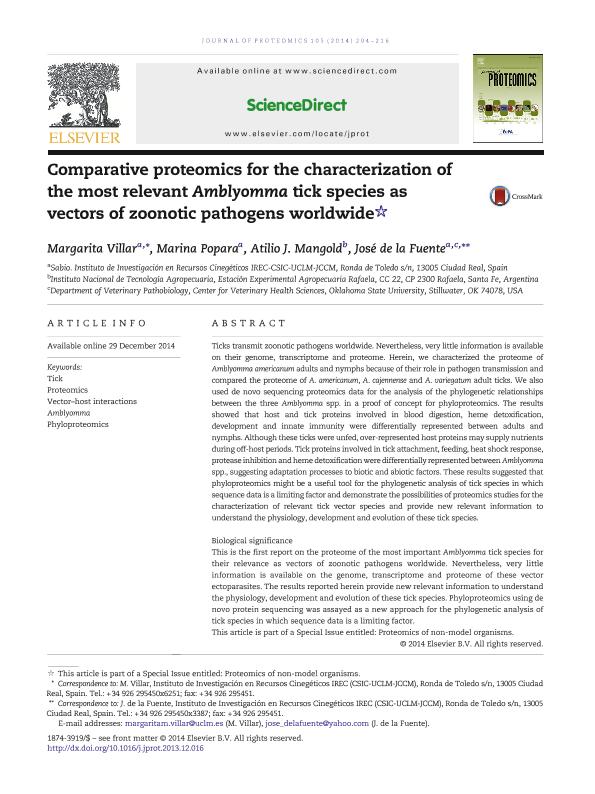Artículo
Comparative proteomics for the characterization of the most relevant Amblyomma tick species as vectors of zoonotic pathogens worldwide
Fecha de publicación:
06/2014
Editorial:
Elsevier Science
Revista:
Journal Of Proteomics
ISSN:
1874-3919
Idioma:
Inglés
Tipo de recurso:
Artículo publicado
Clasificación temática:
Resumen
Ticks transmit zoonotic pathogens worldwide. Nevertheless, very little information is available on their genome, transcriptome and proteome. Herein, we characterized the proteome of Amblyomma americanum adults and nymphs because of their role in pathogen transmission and compared the proteome of A. americanum, A. cajennense and A. variegatum adult ticks. We also used de novo sequencing proteomics data for the analysis of the phylogenetic relationships between the three Amblyomma spp. in a proof of concept for phyloproteomics. The results showed that host and tick proteins involved in blood digestion, heme detoxification, development and innate immunity were differentially represented between adults and nymphs. Although these ticks were unfed, over-represented host proteins may supply nutrients during off-host periods. Tick proteins involved in tick attachment, feeding, heat shock response, protease inhibition and heme detoxification were differentially represented between Amblyomma spp., suggesting adaptation processes to biotic and abiotic factors. These results suggested that phyloproteomics might be a useful tool for the phylogenetic analysis of tick species in which sequence data is a limiting factor and demonstrate the possibilities of proteomics studies for the characterization of relevant tick vector species and provide new relevant information to understand the physiology, development and evolution of these tick species. Biological significance: This is the first report on the proteome of the most important Amblyomma tick species for their relevance as vectors of zoonotic pathogens worldwide. Nevertheless, very little information is available on the genome, transcriptome and proteome of these vector ectoparasites. The results reported herein provide new relevant information to understand the physiology, development and evolution of these tick species. Phyloproteomics using de novo protein sequencing was assayed as a new approach for the phylogenetic analysis of tick species in which sequence data is a limiting factor. This article is part of a Special Issue entitled: Proteomics of non-model organisms.
Palabras clave:
AMBLYOMMA
,
PHYLOPROTEOMICS
,
PROTEOMICS
,
TICK
,
VECTOR-HOST INTERACTIONS
Archivos asociados
Licencia
Identificadores
Colecciones
Articulos(CCT - SANTA FE)
Articulos de CTRO.CIENTIFICO TECNOL.CONICET - SANTA FE
Articulos de CTRO.CIENTIFICO TECNOL.CONICET - SANTA FE
Citación
Villar, Margarita; Popara, Marina; Mangold, Atilio Jose; de la Fuente, José; Comparative proteomics for the characterization of the most relevant Amblyomma tick species as vectors of zoonotic pathogens worldwide; Elsevier Science; Journal Of Proteomics; 105; 6-2014; 204-216
Compartir
Altmétricas




